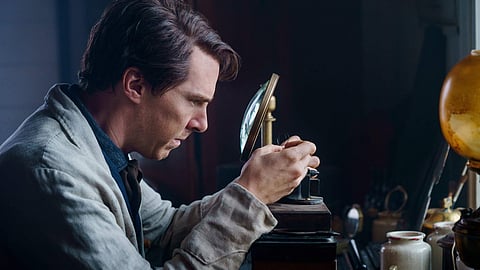The Current War Review: A fine film that falls short of being a masterpiece
Rating:(3.5 / 5)
The Current War receives a wide theatrical release after first premiering at the Toronto International Film Festival in September 2017. Alfonso Gomez-Rejon’s historical film presents an intriguing re-enactment of the famous 'war of the currents' (a battle of wills, ideas, principles, and egos in the electricity-generation of the late-nineteenth century America). The main players among the inventors, entrepreneurs, and business magnates, are Thomas Edison and George Westinghouse. The Current War is ingenious in its portrayal of such historical characters and incidents which form a part of the bigger puzzle of electric power transmission systems of the 1880s and 1890s. Though the acting is nothing short of exceptional, the narrative edges from fact into almost borderline melodrama territory. It’s fine for the film to meander in order to provide detailed insight into these brilliant minds, but the writing needed to be tighter. The story hinges on a standard black-and-white distinction of human nature, as opposed to a more believable grey. We do, however, see some light in Edison’s openly megalomaniacal and manipulative genius, and snippets of darkness in Westinghouse’s highly principled approach. Nikola Tesla’s role is relegated to an-almost side act, while a case can be made for why it should have been front-and-centre along with the other two men. If history has taught us one thing about Tesla, it is that he placed the importance of scientific invention and its resultant benefit to humanity above vain pursuits like money and fame.
Director – Alfonso Gomez-Rejon
Cast – Benedict Cumberbatch, Michael Shannon, Katherine Waterston, Tom Holland, Nicholas Hoult, Matthew Macfadyen, Tuppence Middleton
The character tropes witnessed in The Current War, though based on history and recorded evidence, are more simplistic and one-dimensional than I would have liked them to be. Benedict Cumberbatch’s Thomas Alva Edison is the egotistical, insecure, and manipulative genius who’s as self-involved as he is paranoid about rivals stealing his life’s work. The celebrated inventor is concerned more about legacy than about benefit to common people, and it goes without saying that the man has flagrant disregard for a majority of his contemporaries and subordinates. George Westinghouse (Michael Shannon), is for the long and short of it, Edison’s polar opposite. Principled, dignified, and measured, he refuses to descend to the level of his competitor to prove that his solution of Alternating Current is the best for humans’ electric energy needs. Edison attempts to undercut Westinghouse at every opportunity, holding on to the view that the latter stole his idea of Direct Current and altered it to suit his interests – hence, refusing to join hands. A brilliant Serbian scientist by the name of Nikola Tesla (Nicholas Hoult) enters the fray (first, working for a condescending Edison, and later branching off on his own) proposing the use of an Alternating Current Induction Motor.
The acting is what makes this film. Benedict Cumberbatch puts in an intense masterclass as the troubled genius, who often finds it impossible to look beyond the end of his own nose. And despite that being the dominant character trait, Edison is made to appear humane every now and then. Consistently insisting that he would never invent a machine designed to kill another man (experiencing guilt later for somehow contributing to the first-ever capital punishment by electric chair) and the way in which he comes to terms with the sudden demise of his seemingly long-suffering wife, are scenes in which his humanity trumps narcissism. Michael Shannon’s George Westinghouse is fantastic too. His character may be a diametric opposite of the brash Edison, but his powerful personality is built to fight fire with fire. His philosophy of letting the superior/cost-efficient product do the talking, instead of resorting to slander and a strategic manipulation of the press, is captured beautifully by Shannon. The supporting cast, led by an in-form Tom Holland (Edison’s secretary, Samuel Insull), is terrific.
The fragmented story, which switches from Edison to Westinghouse and back again, focussing less on Tesla, Mary and Marguerite (the respective wives of the two primary characters), Samuel Insull, Franklin Pope, and J P Morgan, has many scenes that make a searing impression. Like when Westinghouse and Marguerite get snubbed by Edison as the train speeds through the station; Thomas talking down to Tesla in their very first interaction; Franklin Pope’s sudden death having a lasting effect on George; Marguerite’s inadvertent loss of speech during an important interview; George Westinghouse being comforted by Marguerite when he admits to a major lapse in judgement... The final minutes are the film's crowning achievement, making this a fine effort. A tighter narrative, and more nuanced characterisation may well have turned it into a masterpiece.

